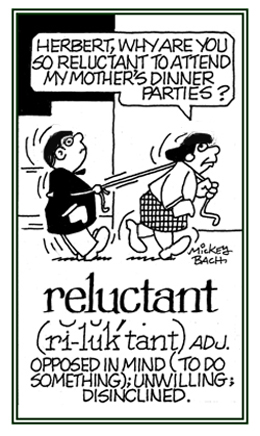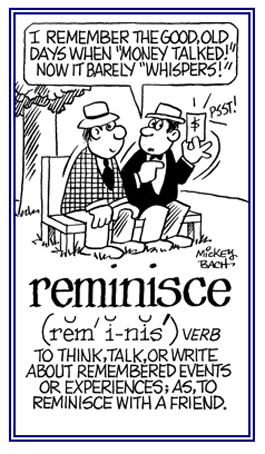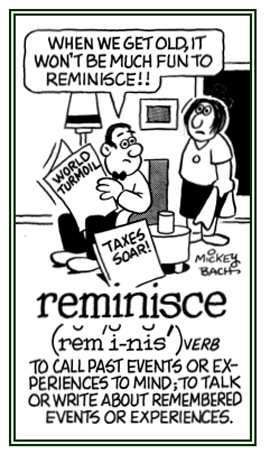re-, red-
(Latin: back, backward, again; used as a prefix)
2. To become, or make someone or something, less anxious, hostile, defensive, or formal.
3. To slacken something that is tensed or tight, e.g. a muscle or a grip on something, or to become looser, less tense, or less tight.
2. Relating to someone who is not very willing to do something and therefore slow to do it: The people waiting for the bus were reluctant to help the drunk get on it when it arrived.
3. Etymology: from Latin reluctari, "to struggle" from re, "against, opposite" + luctari, "to struggle."

Go to this Word A Day Revisited Index
so you can see more of Mickey Bach's cartoons.
2. Something; such as, medicine or therapy, that relieves pain, cures a disease, or corrects a physical disorder.
3. Something that corrects an evil, a fault, or an error.
4. In law, a legal order preventing or redressing a wrong or enforcing a right.
5. Etymology: from Anglo-French remedie, Old French remede; from Latin remedium, "a cure, a remedy, a medicine"; from re-, "again" + mederi, "to heal".
2. To recollect and to share previous experiences or events: Professor George was compiling a book and he was reminiscing about his many observations as an anthropologist and what he learned about African tribes over the years.
3. Etymology: from Latin reminisci, "remember, recall to mind"; from re-, "again" + -miniscim, from the root of mens, "mind".


Go to this Word A Day Revisited Index
so you can see more of Mickey Bach's cartoons.
2. To cancel or hold back from enforcing something; to refrain from exacting (a tax or penalty, for example).
3. To reduce in intensity, or to reduce the intensity of something.
4. To restore something to a previous condition or position.
5. To postpone or defer something.
6. To pardon or to forgive something; such as, a sin or other some transgression.
7. To refer (a case) to another court for further consideration or action.
8. To allow to slacken: "The storm remitted its fury."
2. Money or its equivalent sent from one place, or person, to another as payment for merchandise or services.
2. To pay someone for goods or services, or to compensate someone financially for losses sustained or inconveniences that have been caused.
2. A payment or reward for goods or services or for losses sustained or inconvenience caused.
3. The paying or rewarding of someone for goods or services or for losses sustained or inconvenience caused.
This term often refers to the total compensation received by an executive, which includes not only the base salary but options, bonuses, expense accounts and other forms of compensation.
2. To refurbish something and to make it new or to restore its usefulness: Virginia spent her time on the weekend trying to renovate and freshen up an old oak bench on her balcony.
3. To give new vigor to someone or something: By taking the pills that the doctor suggested and by going to the fitness studio, Brian tried to renovate his health and alertness.



Go to this Word A Day Revisited Index
so you can see more of Mickey Bach's cartoons.
2. The state of having something restored to its former good condition.
2. To ward something off, or to keep something away: Judy used a solvent to repel mosquitoes
The raincoat that Mike wore repeled any kind of precipitation, like water.
3. To ward off or to force back a military attack or invasion: In the novel, it was possible for the army to repel the enemy, with superior forces.
4. To fail to mix or to blend with something else: Jerry could not mix the oil and water because
they repelled each other.
5. To exert a force that tends to push something away or apart: Magnets can both repel and attract one another.
6. To reject or to refuse to accept something or somebody: Everyone was repelled by the sight of the behavior of the drunken man and woman.
7. Etymology: "to drive away, to remove" came from Old French repeller, from Latin repellere, "to drive back"; from re-, "back" + pellere, "to drive, to strike".
The meaning "to affect (a person) with distaste or aversion" is from 1817; while, the adjective "repellent" is recorded from 1643, from Latin repellentem, preposition of repellere; originally a reference to medicines (that reduced tumors); the meanings of "distasteful, disagreeable" were first recorded in 1797. The noun sense of "a substance that repels insects" was first recorded in 1908.
2. Concerning something that causes someone to feel disgust: Jack said, "This TV show is repellent and shouldn't be allowed because of the talkmaster's vulgarisms and personal attacks."
3. Regarding a substance that is used to keep something out or away: Sally used a can of insect spray that had a specific repellent effectiveness to sard off the invading flies and mosquitoes."


